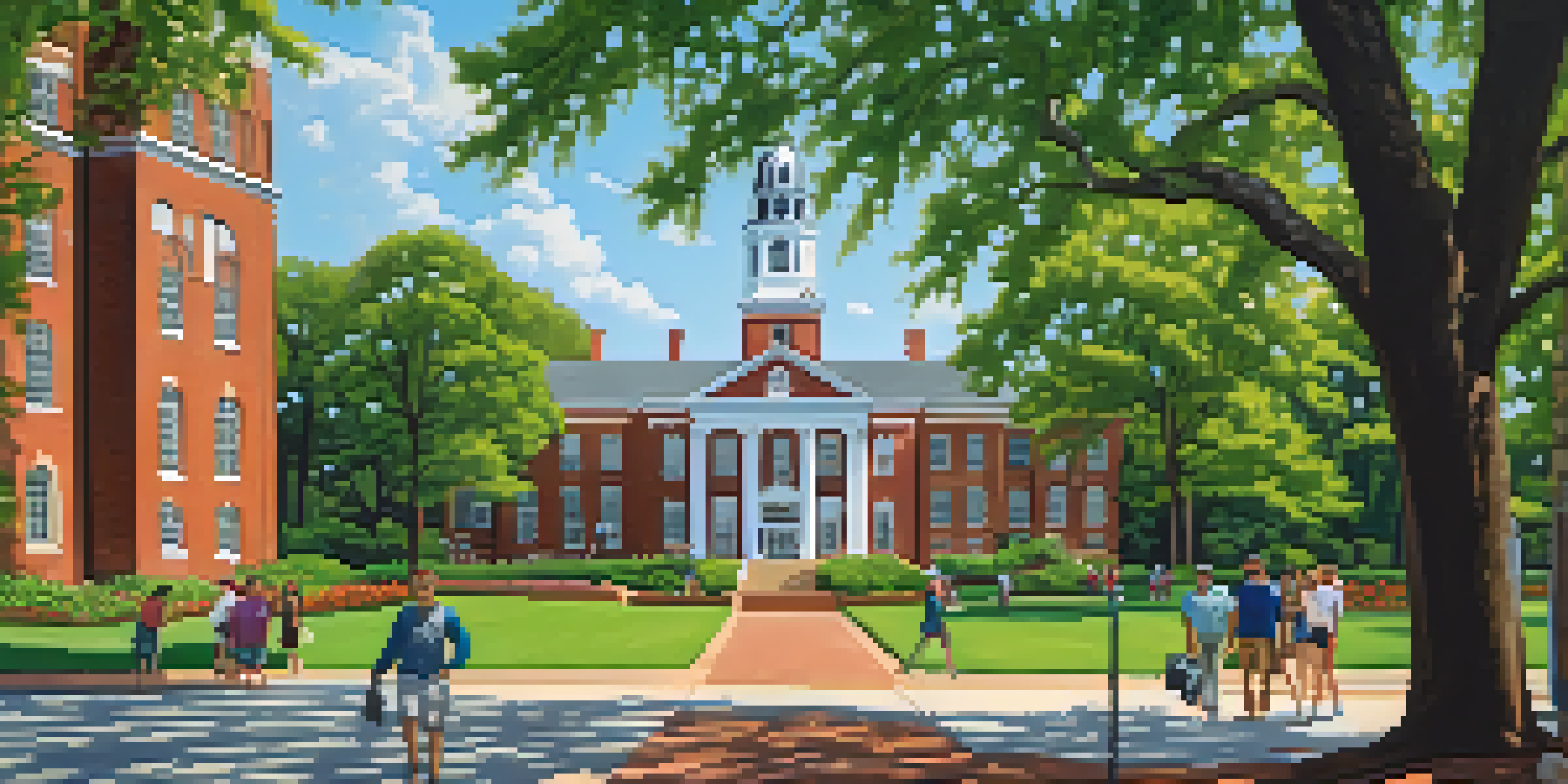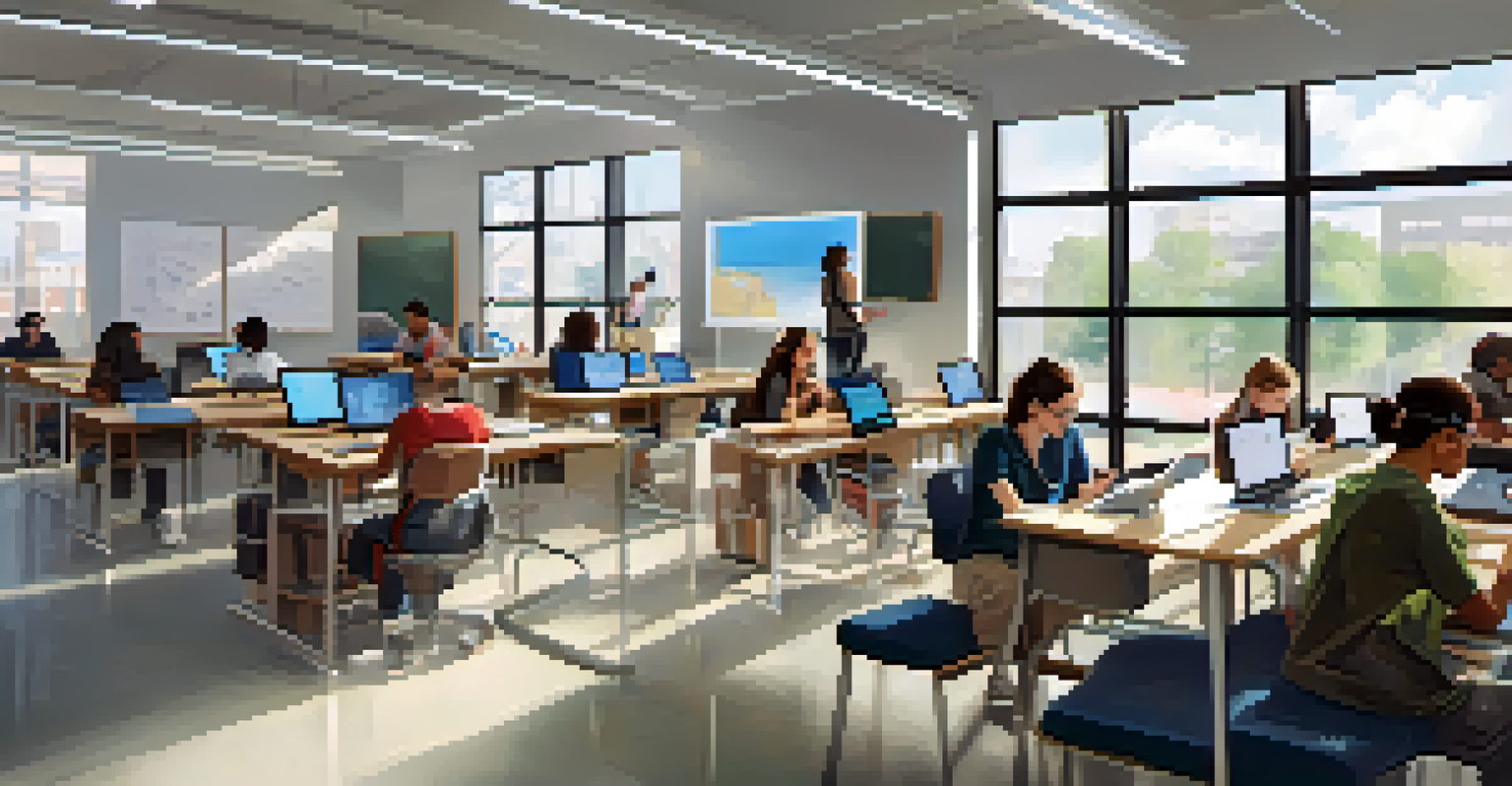Raleigh's Educational Institutions: History and Impact

The Early Foundations of Education in Raleigh
Raleigh's educational journey began in the early 1800s, marked by the establishment of basic schools aimed at providing fundamental education. These institutions were often small, community-driven efforts, reflecting the values of a growing city eager for knowledge. As the population in Raleigh flourished, so did the demand for more formal educational frameworks, laying the groundwork for future institutions.
Education is the most powerful weapon which you can use to change the world.
One of the earliest significant milestones was the founding of the Raleigh Academy in 1805, which provided quality education to young students. This academy represented a shift towards structured learning, emphasizing the importance of education in shaping future leaders. By nurturing the minds of the youth, Raleigh was planting the seeds for a more educated society.
As the years progressed, Raleigh's commitment to education became evident, with the establishment of public schools in the mid-19th century. These institutions aimed to provide education to all children, regardless of their socio-economic background, showcasing Raleigh's belief in equal opportunity. This foundational approach to education set a precedent for what was to come in the city.
The Role of Higher Education Institutions
Higher education in Raleigh took a significant leap with the establishment of North Carolina State University (NCSU) in 1887. NCSU emerged as a land-grant university, focusing on agriculture, engineering, and the sciences, reflecting the needs of a rapidly industrializing society. Its commitment to research and development has made it a cornerstone of Raleigh's educational landscape.

The presence of NCSU has not only transformed the local economy but also enriched the cultural fabric of Raleigh. The university attracts students from across the globe, fostering a diverse community that contributes to innovation and collaboration. This blend of local and international perspectives has positioned Raleigh as a hub for education and creativity.
Raleigh's Education Has Deep Roots
The city’s educational journey began in the early 1800s, evolving from small community schools to more structured institutions.
In addition to NCSU, other institutions like Meredith College and Shaw University have played vital roles in Raleigh's educational ecosystem. These colleges cater to various demographics, enhancing the city's reputation for inclusivity in education. Together, they have created a rich tapestry of higher learning opportunities that shapes the lives of thousands.
Impact of Raleigh's Educational Institutions on the Community
Raleigh's educational institutions have profoundly impacted the surrounding community by providing access to quality education and resources. They have fostered a culture of lifelong learning, encouraging residents to pursue knowledge at all stages of life. Through workshops, seminars, and community programs, these institutions have bridged the gap between academia and everyday life.
An investment in knowledge pays the best interest.
One notable example is the partnership between local schools and universities, which allows high school students to take college courses. This initiative not only prepares students for higher education but also enriches their high school experience. By fostering collaboration, Raleigh's institutions ensure that education remains relevant and accessible.
Moreover, these educational institutions contribute significantly to Raleigh's economy. They create jobs, attract businesses, and stimulate innovation. The synergy between education and the local economy has led to a thriving job market, making Raleigh an attractive destination for professionals and families alike.
Cultural and Historical Significance of Educational Institutions
Raleigh's educational institutions are not just centers of learning; they are also repositories of cultural and historical significance. Many of these schools and colleges have rich legacies that reflect the city’s evolution over the years. Their architecture, traditions, and alumni stories contribute to Raleigh's unique identity.
For instance, Shaw University, established in 1865, is the first historically black university in the South. It has played a crucial role in the civil rights movement and continues to champion social justice and equality through education. The university's history is a testament to the resilience and determination of a community striving for progress.
Higher Education Drives Local Growth
Institutions like North Carolina State University not only enhance the educational landscape but also significantly impact Raleigh's economy and culture.
Similarly, the preservation of historic buildings and landmarks related to education in Raleigh serves as a reminder of the city's commitment to knowledge and progress. These sites are often visited by students, educators, and tourists alike, creating a sense of pride and connection to the past.
Innovations and Advancements in Education
In recent years, Raleigh's educational institutions have embraced innovations that enhance the learning experience. With the integration of technology in classrooms, students are now exposed to a variety of learning tools that make education more interactive and engaging. This shift not only prepares students for the digital age but also caters to different learning styles.
For example, many universities in Raleigh have adopted online learning platforms, allowing students to access courses from anywhere in the world. This flexibility has made education more attainable, breaking down geographical barriers. As a result, Raleigh is becoming a leader in online education, attracting students who seek quality learning experiences.
Additionally, the focus on STEM (Science, Technology, Engineering, and Mathematics) education in local schools prepares students for the jobs of tomorrow. By partnering with local industries and fostering applied learning, Raleigh’s institutions ensure that students are equipped with the skills necessary for a competitive job market.
Challenges Facing Raleigh's Educational Institutions
Despite the many successes, Raleigh's educational institutions face several challenges that need addressing. One significant issue is the disparity in funding across public schools, which can lead to unequal access to resources and opportunities. This inequality can affect the quality of education that students receive based on their zip code.
Moreover, the rapid population growth in Raleigh has put pressure on the existing educational infrastructure. Schools are often overcrowded, making it difficult to provide personalized attention to students. As the city continues to grow, finding solutions to these challenges will be essential to maintaining educational standards.
Challenges and Future Prospects Ahead
Despite progress, Raleigh's educational institutions face funding disparities and overcrowding, necessitating innovative solutions for future success.
Lastly, adapting to the changing job market requires continuous curriculum updates and teacher training. Educational institutions must stay ahead of industry trends to ensure that their programs remain relevant. This ongoing challenge calls for collaboration between schools, universities, and local businesses to create a responsive educational ecosystem.
The Future of Education in Raleigh
Looking ahead, the future of education in Raleigh appears promising, driven by a commitment to innovation and inclusivity. Educational institutions are increasingly focusing on personalized learning experiences that cater to the diverse needs of students. This strategy aims to empower learners, ensuring they have the tools necessary to thrive in an ever-changing world.
Furthermore, partnerships between educational institutions and local businesses are expected to grow, creating pathways for internships and job placements. These collaborations will provide students with practical experience, bridging the gap between education and employment. In turn, this will contribute to a well-prepared workforce that meets the demands of the local economy.

Finally, as Raleigh continues to embrace diversity, educational institutions will play a crucial role in fostering a sense of belonging among students from various backgrounds. By promoting cultural awareness and understanding, these institutions can cultivate a supportive environment where all students can succeed and contribute to the community.